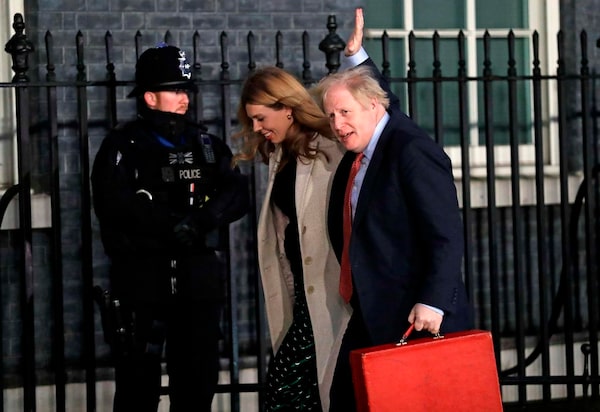
Britain's Prime Minister Boris Johnson, seen here on Dec. 13, 2019, has undoubtedly secured a famous victory.The Associated Press
Simon Usherwood is professor of Politics at the University of Surrey.
It all looked so simple in the end.
A clear slogan – “Get Brexit done” – and one of the best Conservative Party performances in living memory.
Surely now all that fuss and bother about Brexit will be a thing of the past.
Not likely.
While Prime Minister Boris Johnson has undoubtedly secured a famous victory, it might also turn out to be a Pyrrhic one. One of the major problems of the period since the 2016 referendum on EU membership has been the absence of a robust majority in the British Parliament, especially after the disastrous decision by Theresa May to call a snap vote in 2017.
Since then, the various factions – the remainers, the no-dealers, the soft and the hard Brexiters – have been in a limbo, each holding the other back and no one willing to make a concession. That has all been kicked to one side with this election. With the largest majority of any British government for a generation, Mr. Johnson now has the clearest of mandates to cut through the debate and make it happen.
But what?
“Get Brexit done” sounds good, but it means nothing specific. Yes, it taps into the intense frustration that many in Britain have felt over the past year that nothing seems to be happening, but it doesn’t commit to anything very specific.
What we can say is this: Britain will almost certainly be leaving the European Union on Jan. 31.
Mr. Johnson has the votes to get his legislation through the House of Commons, even if there are still some hard-line rebels who had many other problems with his deal apart from the Northern Irish issue.
The House of Lords, where the government does not have a majority, might be more tricky because of the various constitutional implications the bill contains, but the process is unlikely to be more than an inconvenience.
On the night of Jan. 31, you will see lots of images of Mr. Johnson making speeches about how he got it done.
But leaving the EU was only a part of Brexit.
The bigger and more complicated part is the question of what the new Britain-EU relationship might be. And here the Tories have a much tougher time in coming up with answers.
The basic tension is going to be between time and substance.
On the one hand, Mr. Johnson has made many promises to secure that new relationship by the end of 2020, rather than making use of an extension that is available to him for another two years.
On the other, the Tory manifesto calls for a text that, while mainly a basic free-trade agreement, would also contain various other elements of co-operation.
From what we know of the EU’s position on this, that’s likely to trigger a number of counterdemands about commitments on environmental and social standards, and alignments on areas they consider to be related to trade, but which Britain might have a problem with.
If Mr. Johnson wants to hit his timetable, then he’ll have to swallow a lot from the EU and hope his political stock remains high enough to push it through Parliament, while not enraging those voters who wanted Brexit to be about the exercise of control.
If Mr. Johnson wants to argue, then his timetable is in peril, which might well take the edge off his claims to have delivered Brexit.
Faced with this conundrum, we might also note a further issue: Mr. Johnson does not appear to have a strong view about what Brexit is for. Always an adaptable politician – sometimes liberal, sometimes more reactionary – he does not have a deeply held plan for Britain under his watch.
The manifesto contains little clue, being a very minimal document intended to avoid frightening off anyone and to underline the contrast with Labour’s wild plans for economic and social reconstruction.
And so Britain is left with a driver very much in the driving seat, a powerful engine at his command, but also with no particular destination in mind.
As one colleague noted on election night, Mr. Johnson is a big fan of Winston Churchill. Maybe the right quote for today is that “this is not the end. It is not even the beginning of the end. But it is, perhaps, the end of the beginning.”
Keep your Opinions sharp and informed. Get the Opinion newsletter. Sign up today.